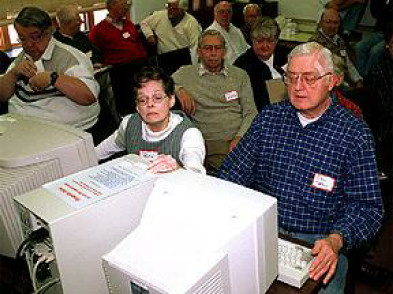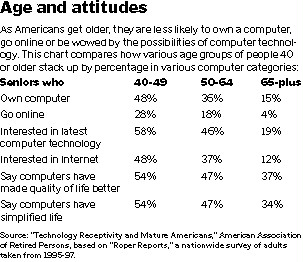Thursday, April 23, 1998
Detroit News -- "Net draws seniors online"
Those who aren't afraid to 'try something new' find a world of free information and benefits
Linda Radin
Don Morrison, left, and Joy Austin of Rochester Hills and Ron Travis of Troy help each other on the computer.By Deb Price / The Detroit News
It started off quite innocently. A little use on a Monday, maybe some on Wednesday. But before long, Joy Austin, who'd learned to surf the Net on free computers at her local Rochester seniors center, discovered she'd become a hard-drive addict.
"I got to where I felt withdrawals on the weekends when the OPC (Older Persons' Commission) wasn't open," the 65-year-old Rochester Hills woman says with a laugh.
"I'd think of something I'd want to investigate on the Internet, but then I couldn't. So I bought myself a computer. Now if I find myself having trouble sleeping at 3 a.m., it's easy to get on the Internet. And I can browse to my heart's content."
Judging by surveys of who's on the Net, Austin is something of a rebel. According to a Harris Poll completed in February, only 8 percent of adults 65 and older are online, making them only 3 percent of all adults out there. By contrast, right behind them agewise, of those 50 to 64, 25 percent are online, or 13 percent of total adult online users.
What's holding them back probably has a lot to do with the fact that the 65-plus crowd is less likely to own a computer or be wowed by its possibilities, according to a sweeping analysis of computer use and attitudes released in December by the American Association of Retired Persons.
But while surfing the Net still remains a younger person's sport, a host of programs in Michigan -- many of them free -- focuses on the special needs of seniors.
"Everyone says they're too old to learn," says Kathryn Miller, 26, who eases the uneasy onto the Net at the Detroit Public Library's free seniors program.
"Some will even call and say, 'I'm this old. Can I come?' But by the third or fourth time, they are showing other people how to do it."
Alice Horn, 27, of New Horizons Computer Learning Center, which has six branches in Michigan, hears the same kinds of fears from older adults who try out her free Internet workshop.
"With older students," Horn says, "it's more like, 'Prove to me why I should be trying to learn this at my age.' At first I just try to talk to them about the benefits of the Internet. Then, as they get involved and start surfing, the explanation is just there for them."
Werner Wahl, who chairs a computer group for the National Association of Investment Clubs in Southeastern Michigan, says at least half of the 60 members are in their 60s and 70s.
"They are a little bit slower to grasp new things," says Wahl, 67, who hosts workshops to showcase the free service and information jewels out on the Net for investors. "But they make up for it with their determination."
A survey by Third Age Media last year found that the top motive for older people to go online is to "try something new."
In the survey, which allowed people to pick out multiple motivations for getting started, 67 percent said they wanted to try something new, 53 percent wanted to e-mail family and friends, and 20 percent had been urged on by children and grandchildren.
When seniors were asked what kind of information they seek online, again given the option of multiple answers, 90 percent said news, 76 percent travel and 74 percent medical.
Florence Vogel, 80, of Rochester Hills says she e-mails her son in Maryland and an exchange student in China who'd stayed in their home years ago. She also roots around in the treasure chest of free medical information to learn about advances that might help her heart ailment.
"I'm just fascinated with it," says Vogel, who has been online since 1993. "It's like magic to me."
Homer Warren, 84, of Rochester felt out of the loop when friends would talk about the Internet.
"I didn't understand a word they were saying," he explains. Now he's has friends all over the world through his e-mail hobby. In addition to "talking" with others in "chat" spaces, he's even vacationed in Sarasota, Fla., with other seniors he's met in cyberspace.
"When people say to me, 'I'm too old to learn that,' " Warren says with a chuckle, "I just say, 'Look, I was 79 when I first got going. So don't tell me you can't learn it!"
Senior Internet sites
Here are some sites to visit for information on subjects of interest to older adults:
* American Association of Retired Persons' AARP Webplace (includes articles on health, finance, etc.; AARP Bulletin and Focus; and weekly real time "chat"): http://www.aarp.org
* Social Security Benefit Information: http://www.ssa.gov
* National Institute on Aging: http://www.senior.com:80/npo/nia.html
* ElderHostel (information about low-cost, senior-oriented, short-term study programs offered at schools worldwide): http://www.elderhostel.org
* SeniorNet: http://www.seniornet.com
* Third Age (general site focused on active older adults): http://www.thirdage.com
* ElderCare Information Network (information about rehabilitation center and retirement communities): http://www.ELDERCONNECT.com
Learn to surf
It's never too late to get lessons in computing and going online. Here's where to look:
* Detroit Public Library, 5201 Woodward: Free "Seniors Searching" Internet classes. Next is 10:30 a.m.-noon May 5. (313) 833-4794.
* Older Persons' Commission, 312 Woodward, Rochester: Two Internet-linked computers available free to anyone 60 or older, their spouse and the disabled. Classes are $3 per hour; regular use of computers is free. To register for the summer beginner's Internet class, call (248) 608-0263.
* American Association of Retired Persons: Members can attend free "Lifetime Connections" workshops -- one is for those completely new to computers, another is more advanced -- on May 16 in Auburn Hills and May 23 in Sterling Heights. Call (800) 240-5165 for details and reservations.
* New Horizons Computer Learning Center (six branches): Free three-hour computer and Internet basics class that is popular with seniors. (313) 525-1501.
E-mail us at Rochster1@aol.com
Phone for the OPC Switchboard is 248-656-1403
Last Updated in May 1998

